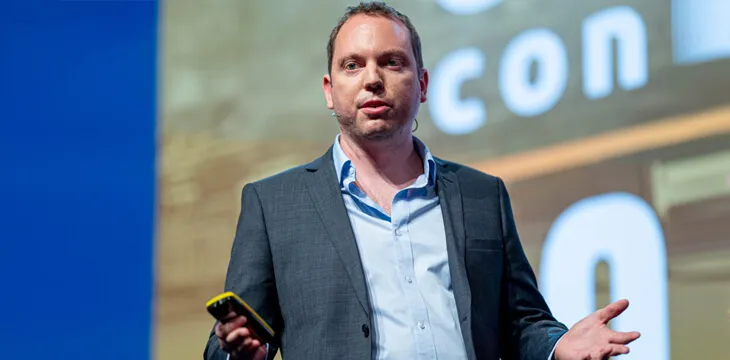|
Getting your Trinity Audio player ready...
|
James Belding, co-founder and CEO of Tokenized, recently joined the BlockDrops podcast where he and host Maurício Magaldi took a deep dive into Tokenized and how putting commercial record-keeping on the blockchain has the power to introduce efficiencies in several industries.
Thanks @blockdropspod for having me on the podcast.
Great chatting with you.https://t.co/b10Z3Ztbn5
— James | Tokenized.com (@JamesBelding) July 29, 2021
The increase in efficiency comes from having programmable contracts, a type of contract that is also referred to as a Ricardian contract.
“Ricardian Contracts—that term was coined by Ian Grigg and his team. The idea is that it quantifies and structures contracts and the associate instruments such that the legal prose, the machine-readable, machine enforceable, human-readable, and human enforceable terms of an agreement are all combined together and stored digitally—so like a digital transformation of contracts,” Belding said.
Belding and the team at Tokenized realized that when a contract is programmable and digitized, several processes can be automated that can free up resources within a company and increase the company’s overall efficiency and its bottom line. What makes this optimization possible is that the traditional method of commercial record-keeping is manual and inefficient.
“Traditionally, commercial recording-keeping Its an extremely analog process, the experience can be likened to emailing your lawyer, the trustee involved, or some financial service provider, who essentially manages that the commercial record for you, and asking them things like, ‘Hey when is the interest payment due? Have the other ones been made on time? How much am I short by? What am I expected to get?’ All of that would be a manual process for that professional service provider, who would then open their cloud drive, grab the contract, read through it, understand it, look at transactions in the past and compare that to what they should be getting, maybe do some calculations and then report back to them saying, ‘You should be due this much on this thing,’ and then what happens next time? to get the next update they either have to ask again or do the work themselves. It has a lot of friction in it, it’s non-intuitive,” Belding said.
“We have seen a lot of clients demand better digitalization of these processes, more real-time insights, just a better experience, and then service providers are also looking to be able to provide those better services to their customers; that applies to pretty much everyone involved in that industry and all the different sides, they would all benefit and appreciate less administrative burdens, less menial task, more higher value and interesting work, that’s where we see the big opportunity and are really targeting our efforts.”
Belding envisions Tokenized to be much further reaching than just commercial-recording keeping, having tokenized contracts makes it possible for business opportunities to exist that were not possible without tokenized contracts. Belding and Magaldi talk about how digitization can create a real-time economy in which companies can have a higher degree of responsiveness.
However, there is still a significant education component to blockchain technologies, which are relatively new, and many enterprises are slow to implement new and innovative solutions.
“I think the most difficult challenge is the education part of it, people have to be comfortable with it. If people are going to be storing their commercial records on it then they need to understand the risks, and that applies to the senior executives and the people who are responsible for the company, and quite often they’re not technical. And what I have found is software, and just software in itself, is often something that people don’t get or appreciate in a lot of ways,” Belding said.
“In terms of appreciating the technical underpinnings that lead to a great user experience or an efficient user experience, it’s quite difficult, and for someone who is not technical, it can be very difficult for them to wrap their head around it and appreciate the value that is going to be derived from it.”
The blockchain and digital currency spaces have come a long way, and companies like Tokenized are building enterprise solutions that businesses can implement to become more productive. However, the nascent industry can be tough for senior-level management at companies to understand because they have not had experience using these new technologies.
To find out how Tokenized has created a solution that frees up a company’s resources allowing them to put those resources to work in other areas of the company, why analog record-keeping is a high friction process, and the use cases Tokenized has beyond commercial record-keeping, you are going to want to watch the episode of the Blockdrops Podcast that features Tokenized co-founder and CEO James Belding.
Watch: CoinGeek Zurich panel, Tokenizing Assets on BSV

 07-06-2025
07-06-2025 





